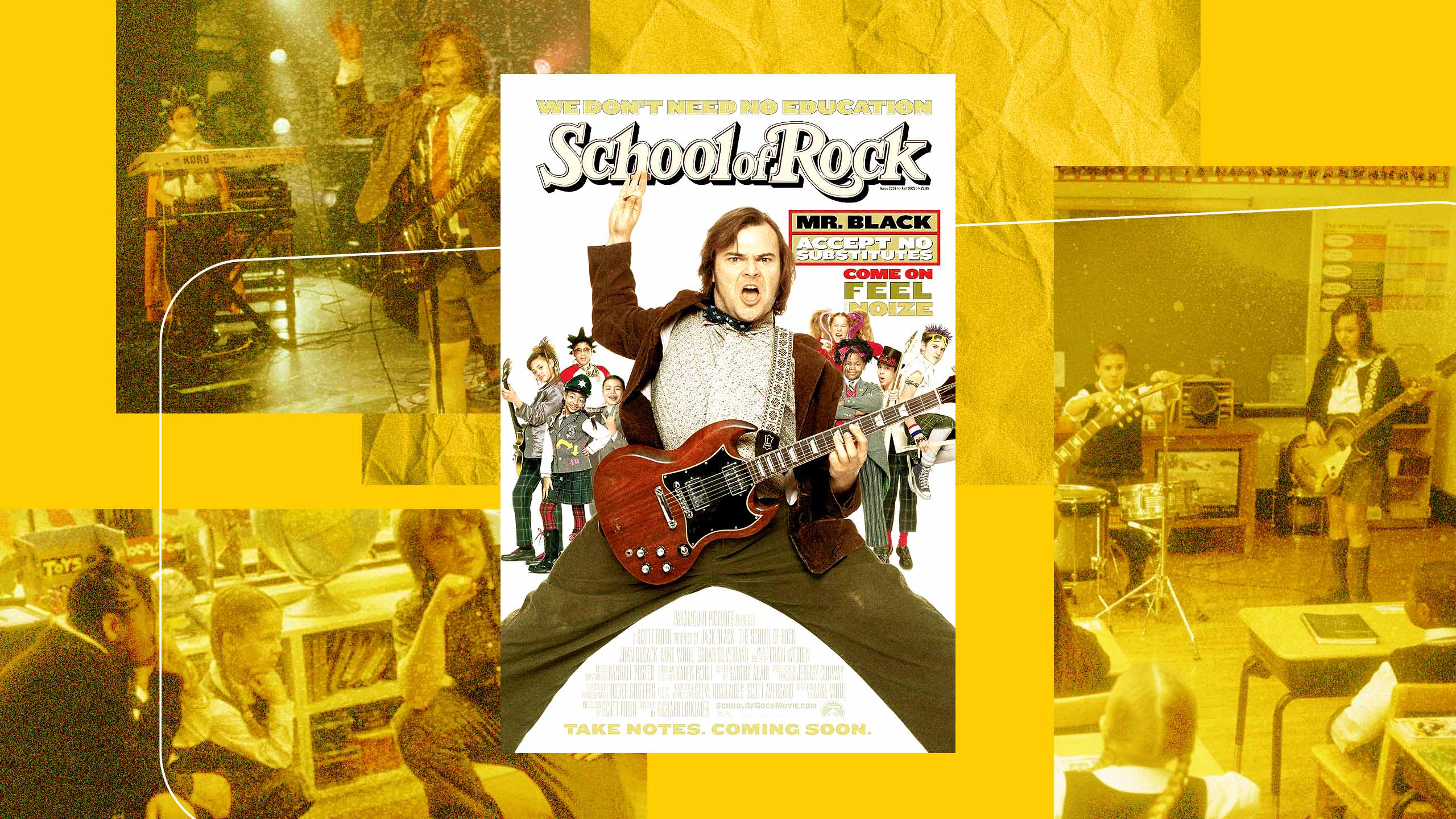Think back to all of the best teachers you’ve had in your life. They might have cared less about strict grades and more about unconventional but collaborative learning methods. They might have taken on the role of class clown for themselves, or gently pushed you to your fullest potential in non-belittling ways. Above all, they might have simply provided you a safe space in their classrooms in which to figure it all out; to step into your weird, not-yet-fully-developed but blossoming queer self.
In the 20 years since its release, School of Rock has remained a comedy that continues to age like a fine wine even without the help of nostalgia’s rose-coloured lenses. Tropes abound in director Richard Linklater’s family-friendly film with an edge—the bumbling, underqualified teacher, the oppressive school environment with no value for the arts, the students who band together and rebel. But it’s one teacher’s nurturing of the neglected, creative passions of his students and the encouragement to put structures of conformity on hold to explore different sides of themselves that gives School Of Rock the queer heart and soul that still resonates two decades later.
When freeloading wannabe rockstar Dewey Finn (Jack Black) is unable to pay rent after getting booted from his band No Vacancy, he poses as a substitute teacher at a prestigious private elementary school using the name of his best friend and roommate, Ned Schneebly, to make ends meet. Apathetic and unwilling to fulfill any teacherly duties at first, “Mr. Schneebly” soon discovers the students in his class have musical chops. He concocts a plan to form a band with them and enter a local Battle of the Bands competition, dodging interference from high-strung principal Rosalie Mullins (played by Joan Cusack, who always gives a campy performance that gays love).
Even before any kids are introduced, Dewey is established as an obnoxious outcast severed from his livelihood—he’s passionate and dead-set on his dreams, but unpredictable and too intensely invested in his own world, even by the standards of his peers. The real Ned Schneebly (played by screenwriter Mike White) once shared Dewey’s dreams of rock ’n’ roll stardom, but hung them up in favour of a lifestyle that falls more in line with traditional heteronormative moulds—taking respectable, non-music “adult” jobs and settling down with his girlfriend.
“You’re not a teacher, Ned,” Dewey insists, holding up an old band photo of themselves dressed in a gothic glam-rock getup. “You’re the cross-dressing, blood-sucking incubus from Maggot Death. That’s the real you!”
“Dewey, I’m not a Satanic sex god anymore,” Ned replies. But you could be, Ned, the audience is thinking. You could be!
It’s a small moment and a throwaway line, but it lays the foundation for Dewey’s character and his relationships. The queer-codedness of watching your friends move on to phases of life that don’t include you or your outlook on the world, that desire to perform in drag and scream on stage forever, is there from the jump.
Black’s charming performance as Dewey Finn may be the catalyst, but it’s the students who are the true heart of the story—and queer audiences who were the same age as they were when the film came out have gotten to grow alongside them. Brian Falduto plays Billy, the fashion-forward (and albeit stereotypically gay-coded) student who becomes the band’s stylist and is given one of the most iconic lines in the film—”You’re tacky and I hate you”—a quote that still gets passed around as a reaction image every now and then on gay Twitter. Though Falduto has said he experienced trouble being labelled the “gay kid” from School Of Rock for much of his childhood, he came out in college and is flourishing in his country music career. Queer non-binary actor and writer Rivkah Reyes plays Katie, the bassist (which everyone knows is pretty much the gayest part in any rock band). “Maybe I’m a selfish bitch but every time I see a girl bassist I can’t help but think that maybe I played a tiny part in it,” they tweeted last year.
Backup singer Tomika (Maryam Hassan) gets cold feet before the Battle of the Bands audition because she’s worried about being judged for her weight. In one of the most touching scenes in the film, Dewey does the unthinkable for a comedy from 2003—he gives her a body-positive pep talk and affirms her worth as a performer and person.
“You know who else has a weight issue? Me,” he tells Tomika. “But once I get up on stage, start doing my thing, people worship me! Because I’m sexy and chubby, man.”
In School Of Rock, no child’s insecure perception of themself is left unchallenged, and no child’s skill or obscure, niche interest is left stifled or underappreciated. Though his intentions in the beginning are selfish, it doesn’t take long for Dewey to accept and cherish every one of his students, seeing their musical and non-musical talents, listening to what they want, tapping into their vision, and serving as a guiding figure through it all. Dewey Finn is the supportive teacher every queer kid wishes they had growing up.
At the Battle of the Bands performance, parents get to see their children’s creativity thrive. It feels like a metaphorical coming out: an unveiling of the secret sides of these young characters who haven’t had the chance to make themselves known yet. So, yes, while it’s absolutely fun to imagine Dewey and Principal Mullins as a T4T couple or Mullins as a lesbian Stevie Nicks groupie (because why not?), it’s the shame-free community built by Dewey and his kids that still breathes queer life into this 20-year-old comfort film.
The arts representing queerness is a cliché that’s been done to death on screen, but School Of Rock’s goofy-yet-earnest take is the embodiment of “when it works, it works.” It’s Jack Black’s favourite movie for a reason, and it’s sure to be a crown jewel of coming-of-age comedies and a feel-good classic for future generations of queer kids to come.


 Why you can trust Xtra
Why you can trust Xtra


